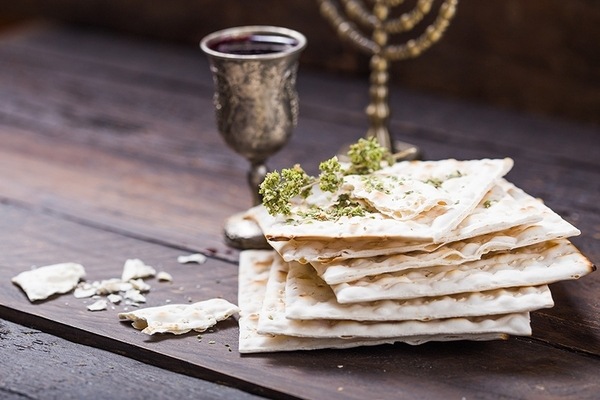Passover

Pesach I
Passover, the Feast of Unleavened Bread.
Passover/ Pesach) commemorates the story of the Exodus, in which the ancient Israelites were freed from slavery in Egypt.
Pesach begins at sundown on April 12-April 20, 2025/15 Nisan-20 Nisan 5785
Torah Portion: Exodus 12:21 - 12:51 & Numbers 28:16 - 28:25
1: Exodus 12:21-24 (4 p'sukim)
2: Exodus 12:25-28 (4 p'sukim)
3: Exodus 12:29-36 (8 p'sukim)
4: Exodus 12:37-42 (6 p'sukim)
5: Exodus 12:43-51 (9 p'sukim)
maf: Numbers 28:16-25 (10 p'sukim)
Haftarah: Joshua 5:2 - 6:1
Pesach I (on Shabbat)
Passover, the Feast of Unleavened Bread.
Torah Portion: Exodus 12:21 - 12:51 & Numbers 28:16 - 28:25
1: Exodus 12:21-24 (4 p'sukim)
2: Exodus 12:25-28 (4 p'sukim)
3: Exodus 12:29-32 (4 p'sukim)
4: Exodus 12:33-36 (4 p'sukim)
5: Exodus 12:37-42 (6 p'sukim)
6: Exodus 12:43-47 (5 p'sukim)
7: Exodus 12:48-51 (4 p'sukim)
maf: Numbers 28:16-25 (10 p'sukim)
Haftarah: Joshua 5:2 - 6:1
Pesach II
Passover, the Feast of Unleavened Bread.
Torah Portion: Leviticus 22:26 - 23:44 & Numbers 28:16 - 28:25
1: Leviticus 22:26-23:3 (11 p'sukim)
2: Leviticus 23:4-14 (11 p'sukim)
3: Leviticus 23:15-22 (8 p'sukim)
4: Leviticus 23:23-32 (10 p'sukim)
5: Leviticus 23:33-44 (12 p'sukim)
maf: Numbers 28:16-25 (10 p'sukim)
Haftarah: II Kings 23:1 - 23:9; 23:21 - 23:25
Pesach Chol ha-Moed Day 1
Passover, the Feast of Unleavened Bread.
Torah Portion: Exodus 13:1 - 13:16
1: Exodus 13:1-4 (4 p'sukim)
2: Exodus 13:5-10 (6 p'sukim)
3: Exodus 13:11-16 (6 p'sukim)
4: Numbers 28:19-25 (7 p'sukim)
Pesach Chol ha-Moed Day 2
Passover, the Feast of Unleavened Bread.
Torah Portion: Exodus 22:24 - 23:19
1: Exodus 22:24-26 (3 p'sukim)
2: Exodus 22:27-23:5 (9 p'sukim)
3: Exodus 23:6-19 (14 p'sukim)
4: Numbers 28:19-25 (7 p'sukim)
Pesach Chol ha-Moed Day 3
Passover, the Feast of Unleavened Bread.
Torah Portion: Exodus 34:1 - 34:26
1: Exodus 34:1-10 (10 p'sukim)
2: Exodus 34:11-17 (7 p'sukim)
3: Exodus 34:18-26 (9 p'sukim)
4: Numbers 28:19-25 (7 p'sukim)
Pesach Chol ha-Moed Day 4
Passover, the Feast of Unleavened Bread.
Torah Portion: Numbers 9:1 - 28:25
1: Numbers 9:1-5 (5 p'sukim)
2: Numbers 9:6-8 (3 p'sukim)
3: Numbers 9:9-14 (6 p'sukim)
4: Numbers 28:19-25 (7 p'sukim)
Pesach Shabbat Chol ha-Moed
Passover, the Feast of Unleavened Bread.
Torah Portion: Exodus 33:12 - 34:26 & Numbers 28:19 - 28:25
1: Exodus 33:12-16 (5 p'sukim)
2: Exodus 33:17-19 (3 p'sukim)
3: Exodus 33:20-23 (4 p'sukim)
4: Exodus 34:1-3 (3 p'sukim)
5: Exodus 34:4-10 (7 p'sukim)
6: Exodus 34:11-17 (7 p'sukim)
7: Exodus 34:18-26 (9 p'sukim)
maf: Numbers 28:19-25 (7 p'sukim)
Haftarah: Ezekiel 37:1 - 37:14
Pesach VII
Passover, the Feast of Unleavened Bread.
Torah Portion: Exodus 13:17 - 15:26 & Numbers 28:19 - 28:25
1: Exodus 13:17-22 (6 p'sukim)
2: Exodus 14:1-8 (8 p'sukim)
3: Exodus 14:9-14 (6 p'sukim)
4: Exodus 14:15-25 (11 p'sukim)
5: Exodus 14:26-15:26 (32 p'sukim)
maf: Numbers 28:19-25 (7 p'sukim)
Haftarah: II Samuel 22:1-51
Pesach VII (on Shabbat)
Passover, the Feast of Unleavened Bread.
Torah Portion: Exodus 13:17 - 15:26 & Numbers 28:19 - 28:25
1: Exodus 13:17-19 (3 p'sukim)
2: Exodus 13:20-22 (3 p'sukim)
3: Exodus 14:1-4 (4 p'sukim)
4: Exodus 14:5-8 (4 p'sukim)
5: Exodus 14:9-14 (6 p'sukim)
6: Exodus 14:15-25 (11 p'sukim)
7: Exodus 14:26-15:26 (32 p'sukim)
maf: Numbers 28:19-25 (7 p'sukim)
Haftarah: II Samuel 22:1-51
Pesach VIII
Passover, the Feast of Unleavened Bread.
Torah Portion: Deuteronomy 15:19 - 16:17 & Numbers 28:19 - 28:25
1: Deuteronomy 15:19-23 (5 p'sukim)
2: Deuteronomy 16:1-3 (3 p'sukim)
3: Deuteronomy 16:4-8 (5 p'sukim)
4: Deuteronomy 16:9-12 (4 p'sukim)
5: Deuteronomy 16:13-17 (5 p'sukim)
maf: Numbers 28:19-25 (7 p'sukim)
Haftarah: Isaiah 10:32 - 12:6
Pesach VIII (on Shabbat)
Passover, the Feast of Unleavened Bread.
Torah Portion: Deuteronomy 14:22 - 16:17 & Numbers 28:19 - 28:25
1: Deuteronomy 14:22-29 (8 p'sukim)
2: Deuteronomy 15:1-18 (18 p'sukim)
3: Deuteronomy 15:19-23 (5 p'sukim)
4: Deuteronomy 16:1-3 (3 p'sukim)
5: Deuteronomy 16:4-8 (5 p'sukim)
6: Deuteronomy 16:9-12 (4 p'sukim)
7: Deuteronomy 16:13-17 (5 p'sukim)
8: Numbers 28:19-25 (7 p'sukim)
Haftarah: Isaiah 10:32 - 12:6
PESACH THE FIRST PILGRIMAGE FESTIVAL
This eight-day festival of Pesach (Passover) is celebrated in the early spring, from the 15 Nissan through the 22nd. It commemorates the emancipation of the Israelites from slavery in ancient Egypt. And, by following the rituals of Passover, we have the ability to relive and experience the true freedom that our ancestors gained.
The Story in a Nutshell
After many decades of slavery to the Egyptian Pharaohs, during which time the Israelites were subjected to backbreaking labor and unbearable horrors, G-d saw the people's distress and sent Moses to Pharaoh with a message: "Send forth My people, so that they may serve Me." But despite numerous warnings, Pharaoh refused to heed G-d's command. G-d then sent upon Egypt ten devastating plagues, afflicting them and destroying everything from their livestock to their crops.
At the stroke of midnight of Nissan 15 of the year 2448 from creation (1313 BCE), G-d visited the last of the ten plagues on the Egyptians, killing all their firstborn. While doing so, G-d spared the Children of Israel, "passing over" their homes—hence the name of the holiday. Pharaoh's resistance was broken, and he virtually chased his former slaves out of the land. The Israelites left in such a hurry, in fact, that the bread they baked as provisions for the way did not have time to rise. 600,000 adult males, plus many more woman and children, left Egypt on that day, and began the trek to Mount Sinai and their birth as G-d's chosen people.
Passover Observances
Passover is divided into two parts. a) The first two days and last two days (that commemorate the splitting of the Red Sea are full-fledged holidays. Holiday candles are lit at night, and Kiddush and sumptuous holiday meals are enjoyed on both nights and days. We don't go to work, drive, write or switch on or off electric devices. We are permitted to cook and to carry outdoors (click here for the details). b) The middle four days are called Chol Hamoed, semi-festive "intermediate days," when most forms of work are permitted.
No Chmetz (Means "no" leavened bread)
THE SEDERS
Pesach commemorates the liberation of the Israelites from Egypt. The first Seder is on the evening of the 14th (this is the beginning of the 15th). On the evening of the 15th (this is the beginning of the 16th), the second Seder is held, and the Sefirat HaOmer, counting of the Omer, starts. The Omer is a counting down of the days from the time of the departure from Egypt, until the time the Torah was received at Shavuot.
The highlight of Passover is the two "Seders," observed on the first two nights of the holiday. The Seder is a fifteen step, family oriented, tradition and ritual packed feast. The focal points of the Seder are:
- Eating matzah, Eating bitter herbs—to commemorate the bitter slavery endured by the Israelites. Drinking four cups of wine or grape juice—a royal drink to celebrate our newfound freedom.
- The recitation of the Haggadah, a liturgy that describes in detail the story of the Exodus from Egypt. The Haggadah is the fulfillment of the biblical obligation to recount to our children the story of the Exodus on the night of Passover.
FEAST OF UNLEAVENED BREAD AND FIRST FRUITS
“When you come into the land which I give to you, and reap its harvest,
then you shall bring a sheaf of the firstfruits of your harvest to the priest.”
(Leviticus 23:10 NKJV)
First Fruits always follows in the week of Passover, during the 7 days of Unleavened Bread. Beginning at the Passover meal (Seder), unleavened bread is eaten for 7 days. The unleavened bread (matzah) reminds us of the haste in which the Children of Israel were delivered from Egypt.
But the unleavened bread has a far deeper significance as well. Leaven, in the Bible, is symbolic of sin, so to be “unleavened” means to be “sin-less”. Now matzah is pierced and striped during the baking process, so for the 7 days of Passover we eat unleavened bread, symbolizing the sinless, though pierced and striped, “true bread which came down from heaven” (John 6:32).
First Fruits, like Passover is tied to the harvest season. The newly ripened grain was cut from the stalk and the sheaf was presented as an offering to the Lord each year following Passover. In many years there were 3 days and 3 nights between the sacrifice of Passover and the raising up of the first fruits of the harvest. In the year that Yeshua was sacrificed as our Passover Lamb, there were exactly 3 days and 3 nights from His death until His raising from the dead on First Fruits.
“But now Christ is risen from the dead,
and has become the firstfruits of those who have fallen asleep”
(1 Corinthians 15:20 NKJV)
